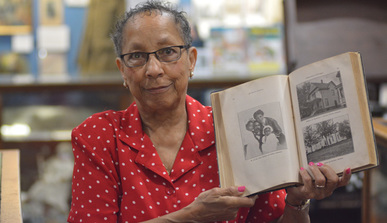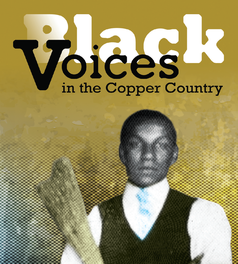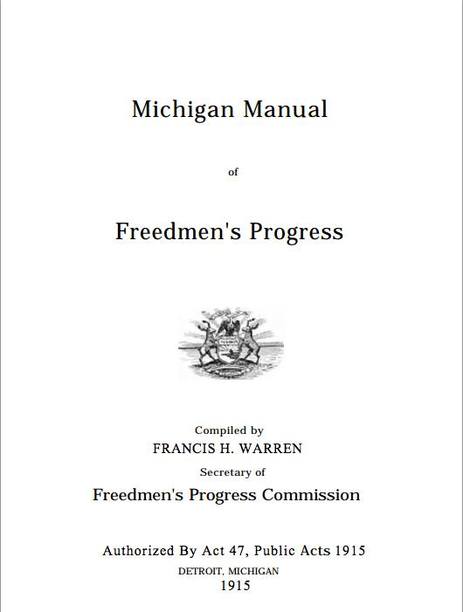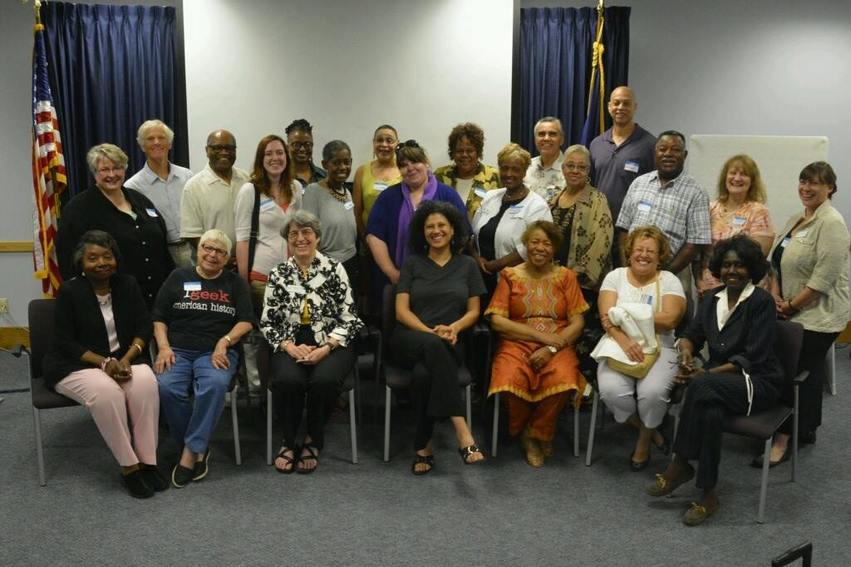INSTITUTE OF PUBLIC SCHOLARSHIP
SELECT EXHIBITS FOR A NEW CENTURY PROJECTS

Niles History Center: Profiles and Portraits: African Americans in Niles
The Niles History Center (NHC) along with several area partners, is spearheading a project called Profiles and Portraits: African-Americans in Niles’ Past, Present and Future. This collaborative project expands a community history engagement initiative that aims to uncover and share stories of African-Americans in Niles from the 1850s to the present. The largely untold story of African-Americans who arrived as part of multiple networks such as the Underground Railroad and settled here has lessons with tremendous potential to address issues facing the community of Niles. The support systems, family structures and community dynamics of Niles led to the establishment of black-owned businesses and a “corridor” which included a school, church and Michigan’s first African-American Masonic lodge. To discover, analyze and disseminate this history so that it can be applied to the present, three products will be produced: a digital resource database, a local history exhibit and a walking tour. A celebratory program will be held a year from the program’s start. (grant amount $24,915)
Community input sought in project to tell history of African-Americans in Niles
By Craig Haupert
Published 9:12 am Friday, July 1, 2016
Niles resident Pat Gresham did not know it until recently, but there was a piece of history sitting on her bookshelf for many years.
The Michigan Manual of Freedom’s Progress, which was compiled in 1915, includes biographies of black landowners and professionals, including several citizens from Niles.
Niles History Center: Profiles and Portraits: African Americans in Niles
The Niles History Center (NHC) along with several area partners, is spearheading a project called Profiles and Portraits: African-Americans in Niles’ Past, Present and Future. This collaborative project expands a community history engagement initiative that aims to uncover and share stories of African-Americans in Niles from the 1850s to the present. The largely untold story of African-Americans who arrived as part of multiple networks such as the Underground Railroad and settled here has lessons with tremendous potential to address issues facing the community of Niles. The support systems, family structures and community dynamics of Niles led to the establishment of black-owned businesses and a “corridor” which included a school, church and Michigan’s first African-American Masonic lodge. To discover, analyze and disseminate this history so that it can be applied to the present, three products will be produced: a digital resource database, a local history exhibit and a walking tour. A celebratory program will be held a year from the program’s start. (grant amount $24,915)
Community input sought in project to tell history of African-Americans in Niles
By Craig Haupert
Published 9:12 am Friday, July 1, 2016
Niles resident Pat Gresham did not know it until recently, but there was a piece of history sitting on her bookshelf for many years.
The Michigan Manual of Freedom’s Progress, which was compiled in 1915, includes biographies of black landowners and professionals, including several citizens from Niles.

Black Voices in the Copper Country
Michigan Technological University: Black Voices in the Copper Country
The project proposes to illuminate black social history in Michigan’s northwestern Upper Peninsula, especially Houghton and Keweenaw counties. Through significant outreach efforts, public programming, an online exhibit and the development of research guides and datasets, this project will shed new light on a previously underrepresented group in the historical narratives of this portion of the state of Michigan. Grant amount ($22,713; Houghton)
African American History Presentation to be Held on March 2
FEBRUARY 24, 2016 LINDSAY HILTUNEN
EXHIBITS AND EVENTS, PUBLIC EVENTS, SPEAKERS AND PRESENTATIONS
Dr. Michelle S. Johnson, a Community Historian with the Michigan Historical Center, will be presenting a talk on African American history in Michigan on Wednesday, March 2 at 4:00 p.m. at the Van Pelt and Opie Library.
As part of the “Black Voices in the Copper Country” project, the Michigan Technological University Archives and Copper Country Historical Collections will be hosting a talk by Dr. Michelle S. Johnson, a Community Historian with the Michigan Historical Center in Lansing.
Black Voices in the Copper Country
Michigan Technological University: Black Voices in the Copper Country
The project proposes to illuminate black social history in Michigan’s northwestern Upper Peninsula, especially Houghton and Keweenaw counties. Through significant outreach efforts, public programming, an online exhibit and the development of research guides and datasets, this project will shed new light on a previously underrepresented group in the historical narratives of this portion of the state of Michigan. Grant amount ($22,713; Houghton)
African American History Presentation to be Held on March 2
FEBRUARY 24, 2016 LINDSAY HILTUNEN
EXHIBITS AND EVENTS, PUBLIC EVENTS, SPEAKERS AND PRESENTATIONS
Dr. Michelle S. Johnson, a Community Historian with the Michigan Historical Center, will be presenting a talk on African American history in Michigan on Wednesday, March 2 at 4:00 p.m. at the Van Pelt and Opie Library.
As part of the “Black Voices in the Copper Country” project, the Michigan Technological University Archives and Copper Country Historical Collections will be hosting a talk by Dr. Michelle S. Johnson, a Community Historian with the Michigan Historical Center in Lansing.

Southwest Michigan Black Heritage Society: Controlling the Narrative: Authentic Hearing
Controlling the Narrative seeks to recover and retell the stories of a multi-generational group of black ancestors and descendants through community conversations, video, and a 3-act play all based on the similar themes that emerge out of the narratives of past and present youth and adults of color. Grant award ($13,366; Kalamazoo)
more About controlling the narrativeDon’t you call me out my name. For generations black people have been saying this as an admonition to other black people, demanding that they not call them something other than what their family named them; because black people have always known the identity shaping power of calling someone something that their mamma didn’t or something that their ancestors didn’t. Or the life-threatening power of being named something that someone who respected them wouldn’t. As a result, black people’s bodies have been at the mercy of these same hands that have been able to, at any moment of movement toward autonomy, equality or right revolution, re-write the human as animal or re-write the freedom fighter or the child as criminal. Not long ago in fact, Tamir Rice, a young black man shot and killed in Cleveland, Ohio while playing with a toy gun, was blamed along with his family by the city of Cleveland for his death. Steve Loomis, President of the Cleveland Police Patrolman’s Association went as far as to say “Tamir Rice is in the wrong… He’s menacing. He’s 5-feet-7, 191 pounds. He wasn’t that little kid you’re seeing in pictures. He’s a 12-year-old in an adult body. Tamir looks to his left and sees a police car. He puts his gun in his waistband. Those people—99 percent of the time those people run away from us.” What this makes clear is that white people have been calling black people out of their name for centuries. What this also makes clear is that there is power in controlling the narrative.
Controlling the Narrative seeks to recover and retell the stories of a multi-generational group of black ancestors and descendants through community conversations, video, and a 3-act play all based on the similar themes that emerge out of the narratives of past and present youth and adults of color. Grant award ($13,366; Kalamazoo)
more About controlling the narrativeDon’t you call me out my name. For generations black people have been saying this as an admonition to other black people, demanding that they not call them something other than what their family named them; because black people have always known the identity shaping power of calling someone something that their mamma didn’t or something that their ancestors didn’t. Or the life-threatening power of being named something that someone who respected them wouldn’t. As a result, black people’s bodies have been at the mercy of these same hands that have been able to, at any moment of movement toward autonomy, equality or right revolution, re-write the human as animal or re-write the freedom fighter or the child as criminal. Not long ago in fact, Tamir Rice, a young black man shot and killed in Cleveland, Ohio while playing with a toy gun, was blamed along with his family by the city of Cleveland for his death. Steve Loomis, President of the Cleveland Police Patrolman’s Association went as far as to say “Tamir Rice is in the wrong… He’s menacing. He’s 5-feet-7, 191 pounds. He wasn’t that little kid you’re seeing in pictures. He’s a 12-year-old in an adult body. Tamir looks to his left and sees a police car. He puts his gun in his waistband. Those people—99 percent of the time those people run away from us.” What this makes clear is that white people have been calling black people out of their name for centuries. What this also makes clear is that there is power in controlling the narrative.
CONTROLLING THE NARRATIVE common grounds performance

David L. Head Foundation: Tracking Advancement: 100 Years of Progress?
Tracking Advancement: 100 Years of Progress? will extend the life of a seminal 1915 publication, The Michigan Manual of Freedmen’s Progress through identifying and interviewing descendants of those represented in the Manual, commemorate the efforts of the individuals and groups highlighted in the text and who have sought to retain its prominence in our state’s history and engage in important dialogue concerning the contemporary progress of black people in Michigan. The project will work in collaboration with The Historical Research Repository, Inc., Charles H. Wright Museum of African American History, The Association for the Study of Negro Life and History (ASALH) The Detroit Historic Sites Committee (DHSC), The Michigan Historical Center (MHC) and the History Department at Wayne State University.
($25,000; Detroit)
Tracking Advancement: 100 Years of Progress? will extend the life of a seminal 1915 publication, The Michigan Manual of Freedmen’s Progress through identifying and interviewing descendants of those represented in the Manual, commemorate the efforts of the individuals and groups highlighted in the text and who have sought to retain its prominence in our state’s history and engage in important dialogue concerning the contemporary progress of black people in Michigan. The project will work in collaboration with The Historical Research Repository, Inc., Charles H. Wright Museum of African American History, The Association for the Study of Negro Life and History (ASALH) The Detroit Historic Sites Committee (DHSC), The Michigan Historical Center (MHC) and the History Department at Wayne State University.
($25,000; Detroit)

